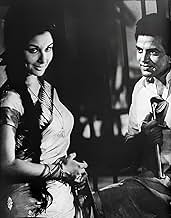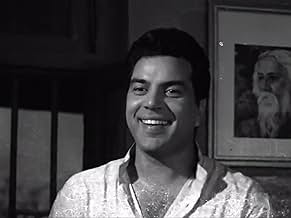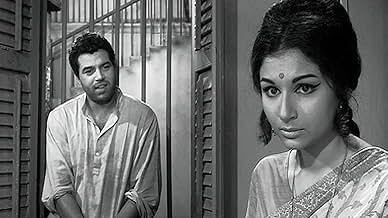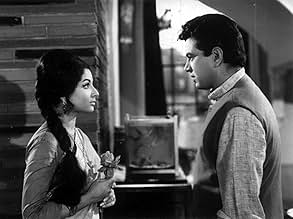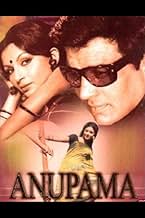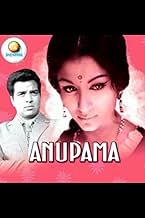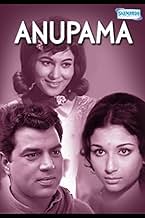अपनी भाषा में प्लॉट जोड़ेंMohan Sharma (Tarun Bose) is a workaholic whose life changes dramatically after his wife dies giving birth to their daughter Uma (Sharmila Tagore). He despises the daughter by day, and adore... सभी पढ़ेंMohan Sharma (Tarun Bose) is a workaholic whose life changes dramatically after his wife dies giving birth to their daughter Uma (Sharmila Tagore). He despises the daughter by day, and adores her when drunk at night. Uma's life gets better as she comes of age and has a relationsh... सभी पढ़ेंMohan Sharma (Tarun Bose) is a workaholic whose life changes dramatically after his wife dies giving birth to their daughter Uma (Sharmila Tagore). He despises the daughter by day, and adores her when drunk at night. Uma's life gets better as she comes of age and has a relationship with a sensitive poet, Ashok (Dharmendra), who slowly brings her out of her shell.
- पुरस्कार
- 1 जीत और कुल 4 नामांकन
- Anita Bakshi 'Annie'
- (as Shashikala)
- Suresh Bakshi
- (as Bharadwaj)
- Moses
- (as David)
फ़ीचर्ड समीक्षाएं
Anupama is the story of a shy and retreating girl who grows up with the stigma of guilt, and her father's reproach and blame for having lost her mother during childbirth. It's a poignant journey of how she overcomes her own guilt and steps out of her father's overbearing shadow.
Tarun Bose - another unsung character actor from Hindi cinema - plays Sharma, an affluent businessman who has married late but deeply loves his wife. When she dies in childbirth, he blames the newborn daughter Uma for having separated him from his only joy in life. She grows up as a timid young girl who pines for her father's affection, feels the guilt of her mother's demise and is barely able to express herself as a result. Indeed her first words in the movie are almost an hour into it, in a lilting song amidst nature.
Sharmila Tagore, performs exquisitely as the daughter Uma, and despite having very few words to say, truly embodies the repressed, melancholy character, especially with her eyes that express all her emotions. Of course it helps that she is so beautiful.
The scenes between father and daughter are poignant, and are sensitively handled. Deep inside, Sharma does love his daughter, but it shows only when he is drunk, and not in his senses.
Hindi cinema has produced many excellent actors who are grossly underrated, and none more so than Dharmendra, who is not really remembered today for some of his sensitive portrayals, and his flair for comedy. Here he plays Ashok, a writer by profession from a modest background whose keen mind is quick to notice Uma's angst. Which also attracts the two together.
Helping the plot race along - despite the melancholy theme, there's never a dull moment in the screenplay - are Shashikala who plays Annie (or Anita) - an effervescent tomboy and a complete anti-thesis of Uma's character- and a young Deven Verma who plays Arun, her love interest and a childhood friend of Ashok.
There's also David - a Hrishikesh Mukherjee regular - provides great comic relief as Sharma's cheerful friend Moses. He has the best line in the movie. Translated from Hindi, "Death is great fun. The dying person doesn't know when it will happen, and everybody else cries." This has to be one of David's finest performances - he jokes, dances with Shashikala, and generally brings the house down with his pearls of wisdom.
An unspoken love develops between Ashok and Uma, that threatens to die unrequited. Ashok understands the father's grief, but resents his ignorance and neglect of his daughter. The song 'Ya dil ki suno..' sung by the peerless Hemant Kumar, who also scores the music, is heart-rending. This song alone is worth the price of the movie. Written by Kaifi Azmi, It poetically describes the insensitivity of the father: "what a flower has bloomed in nature, the gardener has no love for it".
Can Uma really overcome her internal barriers and take the leap to be with Ashok? Does she really have the strength to break free from emotions of both love and terror for her father? Despite a predictable ending, the movie still surprises in the end.
Modern day directors can learn a lot about how to balance emotional content with sparkling comedy. And aided by excellent performances all round, 'Anupama' makes for a memorable experience.
Although the movie takes its own time to develop the characters thoroughly and although you wouldn't expect anything less from Hrishikesh Mukherjee in that regard, I did feel that the movie could have been shortened a little bit. Also, Shashikala's role seemed a little exaggerated.
In general, the movie is a gem and I wish viewers all over the world could be introduced to such Hindi classics for a true appreciation of the range of "Bollywood" movies over the years.
A poignant film portrayed beautifully and realistically, it is a subtle yet powerful episode made with heart and sincerity. Mukherjee's excellent direction is aided by fantastic cinematography, very pleasant music, and above all, brilliant dialogue which enhances the otherwise serene narrative and helps define the characters. Although some may find the film a tad slow, I found the pacing perfectly balanced. I was engaged by its exquisite authenticity, and its humanistic warmth filled me with positivity. Its graceful simplicity just draws you in. Wavering between slice-of-life social drama and delicate romance, Anupama offers a profound exploration of the human experience and an affecting glimpse into the fragility of relationships. Equally significant is its incisive commentary on the societal norms, gaps, and circumstances of its time.
The film has a great collaborative effort by the ensemble cast. Sharmila Tagore delivers a beautifully restrained performance, and Dharmendra is fantastic as the sensitive poet Ashok. Shashikala is extremely likable and funny and makes her presence felt as the vivacious Anita. Ditto for Deven Verma who plays Arun. David provides great comic relief as Uma's father's kind and humourous friend and his stories throughout the film are hilarious. Tarun Bose is excellent as Uma's father Mohan, and the ever great Durga Khote as Ashok's mother, as well as Naina as his lovely sister, provide great support. The story ends on a staggeringly revelatory and moving note. All in all, I highly recommend this classic to people who like artistic quality films. It might require patience, but it's highly rewarding.
Hrishikesh Mukherjee's attempt to make "Bimal Roy Cinema" as a tribute. Anupama, widely known as Hrishikesh Mukherjee's one of the Greatest Achievement is sort of Bimal Roy Cinema and to confirm it there is tagline at the beginning, "Dedicated to Bimal da". Anupama has soul connected to a Woman's strained life just like Bimal Roy films had but Hrishi da makes it more of a love story than a social topic. In Anuradha he gives tribute to all Women who have sacrificed their everything to make men successful and so it became universal concept but that's not the case here for Anupama. The film is about a girl whose mother immediately after her birth so the Father blames her for this loss and even the girl starts believing it as her own fault. Then finally sunshine called Love comes into her life and encourages her to Live incomparably. Anupama has many emotional moments where you can't hold your tears, one is when you realise her pain, another one when Dharmendra sings painful poem. In climax it feels like film misses something, don't know what exactly, may be Father-daughter final face off or acknowledgement or maybe social message. Otherwise it is a very good emotional drama keeping all qualities upto the mark. Sharmila Tagore is fantastic in this shy yet full of life role, Dharmendra shines as a poet and a man with principles, Shashikala is in top form in her favourite zone of chatterbox and free minded girl. Dialogues writing is are pure class, i don't see nothing wrong about it rather many dialogues are overwhelming and ahead of time. Hrishikesh Mukherjee's direction is nice, he covered all elements with his intelligence. The shortcomings are unacceptable though. Anupama should have had more appealing social issue and then it would have left stronger impact.
RATING - 7/10*
By - #samthebestest
क्या आपको पता है
- ट्रिवियाKuch Dil Ne Kaha Kuch Bhi Nahin. Sharmila Tagore had turned up for the song's shoot in Mahabaleshwar at 5 am in full makeup and with her hair styled in a bouffant. Director Hrishikesh Mukherjee disapproved of the bouffant and told the actress that it didn't go with her character. He gave in when she insisted on keeping it. Later, however, Tagore regretted her appearance in the song and wished that she had listened to the director. [
- साउंडट्रैकYa Dil Ki Suno Duniyawalo
Sung by Hemanta Mukherjee (as Hemant Kumar)
Music composed by Hemanta Mukherjee (as Hemant Kumar)
Lyrics by Kaifi Azmi
टॉप पसंद
- How long is Anupama?Alexa द्वारा संचालित
विवरण
- चलने की अवधि2 घंटे 28 मिनट
- रंग
इस पेज में योगदान दें


